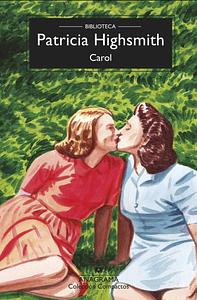Take a photo of a barcode or cover
All the characters are problematic and kind of horrible to someone else in the story, the pacing was awfully slow and it was one of the most boring books I've ever read. I appreciate this book for it's time, but I'd tell anyone else to give this one a skip.
A hard-hitting yet subtle snapshot of what life would probably have been for a white upper-class queer person of the time, this book was an important read, but a sad and slow one. I'm glad to have read it.
I loved the film, but loved this novel and don't know why I snoozed on Highsmith for so long.
I wished the Afterword was actually published as an intro, as I felt like it indirectly addresses the power imbalance so many readers feel between Carol and Therese.
This book, and their journey, had my heart the whole way through, and I don't often feel that kind of love and connection to a novel. I immediately wanted to throw out my current WIP and start one featuring a romance. Yearning is such an underrated emotion in literature, this is an entire novel built on frission and playing with it. This is atmospheric and boozed-up to hell.
"The milk seemed to taste of bone and blood, of warm flesh, or hair, saltless as chalk yet alive as a growing embryo."
"Carol was like a secret spreading through her, spreading through this house too, like a light invisible to everyone but her."
"Carol had said she was at Forty-eighth and Madison. She could be here in ten minutes. Therese glanced around her room, and her face in the mirror, and decided to let it all go."
"It shook Therese in the profoundest part of her where no words were, no easy words like death or dying or killing. Those words were somhow future, and this was present. An inarticulate anxiety, a desire to know, know anything, for certain, had jammed itself in her throat so for a moment she felt like she could hardly breathe. Do you think, do you think, it began."
"She did not want to talk. Yet she felt there were thousands of words choking her throat, and perhaps only distance, thousands of miles, could straighten them out. Perhaps it was freedom itself that choked her."
"Once they came upon a little town they liked and spent the night there, without pyjamas or toothbrushes, without past or future, and the night became another of those islands in time, suspended somewhere in the heart or in the memory, intact and absolute."
I wished the Afterword was actually published as an intro, as I felt like it indirectly addresses the power imbalance so many readers feel between Carol and Therese.
This book, and their journey, had my heart the whole way through, and I don't often feel that kind of love and connection to a novel. I immediately wanted to throw out my current WIP and start one featuring a romance. Yearning is such an underrated emotion in literature, this is an entire novel built on frission and playing with it. This is atmospheric and boozed-up to hell.
"The milk seemed to taste of bone and blood, of warm flesh, or hair, saltless as chalk yet alive as a growing embryo."
"Carol was like a secret spreading through her, spreading through this house too, like a light invisible to everyone but her."
"Carol had said she was at Forty-eighth and Madison. She could be here in ten minutes. Therese glanced around her room, and her face in the mirror, and decided to let it all go."
"It shook Therese in the profoundest part of her where no words were, no easy words like death or dying or killing. Those words were somhow future, and this was present. An inarticulate anxiety, a desire to know, know anything, for certain, had jammed itself in her throat so for a moment she felt like she could hardly breathe. Do you think, do you think, it began."
"She did not want to talk. Yet she felt there were thousands of words choking her throat, and perhaps only distance, thousands of miles, could straighten them out. Perhaps it was freedom itself that choked her."
"Once they came upon a little town they liked and spent the night there, without pyjamas or toothbrushes, without past or future, and the night became another of those islands in time, suspended somewhere in the heart or in the memory, intact and absolute."
emotional
hopeful
sad
tense
medium-paced
Plot or Character Driven:
Character
Strong character development:
Yes
Loveable characters:
Yes
Diverse cast of characters:
Complicated
Flaws of characters a main focus:
Yes
some of the best writing about love and life maybe ever? I've never seen a novel so beautifully and succinctly capture the entirety of both the deep connection between two people and the massive gulf that separates them, whether it's patriarchy, class, age or anything else. if you know you know.
emotional
funny
hopeful
inspiring
reflective
medium-paced
Plot or Character Driven:
Character
Strong character development:
Yes
challenging
emotional
reflective
tense
medium-paced
Plot or Character Driven:
Character
Strong character development:
Yes
Loveable characters:
Complicated
Diverse cast of characters:
No
Flaws of characters a main focus:
Yes
I must confess, I fell asleep trying to watch the movie a while back, so I wasn’t sure how this would fly. But I hit it at the right time. The gauzy haze with which the protagonist approaches her queer questioning impetus felt, along with some other aspects of the book, historical? And that actually made it more interesting to me. Questioning without any sense of queer culture and just being the straightest, mousiest woman, who flits from societal expectation to the next, until real emotion trumps her—kind of feels relatable.
Maybe it’s just post-covid days, but there is a disruptive element to the fifties depicted here. An in-group, out-group that the privileged never see. Had she more of an internal life the signs that she’s not particularly inclined toward the norm would prompt a galvanzing effort. Instead, an outside factor like Carol has to.
How the questioning functioned was the most interesting aspect to me, aside from Carol herself, who is basically the opposite of our girl. Mysterious, refined, in a heteronormative relationship and has a child, but also immediately a caretaker of a communicable obsession—ushering them into a objectively pretty tame, but somehow hedonistic awakening. Where the aperture of perspective shifts, though the protagonist is exceptionally mundane. It’s a relatable transition that felt organic for her.
Maybe it’s just post-covid days, but there is a disruptive element to the fifties depicted here. An in-group, out-group that the privileged never see. Had she more of an internal life the signs that she’s not particularly inclined toward the norm would prompt a galvanzing effort. Instead, an outside factor like Carol has to.
How the questioning functioned was the most interesting aspect to me, aside from Carol herself, who is basically the opposite of our girl. Mysterious, refined, in a heteronormative relationship and has a child, but also immediately a caretaker of a communicable obsession—ushering them into a objectively pretty tame, but somehow hedonistic awakening. Where the aperture of perspective shifts, though the protagonist is exceptionally mundane. It’s a relatable transition that felt organic for her.
One of the first books I've read that made me cry with joy. You do forget how few books have a happy ending these days, such a sweet respite from the usual tragic endings of queer novels.
I will admit until the final 20 pages, this book was sitting on a 3 star rating for me. Mainly because of its narrator. There is nothing wrong with Therese, but I find her character suffers from exactly the same shortcomings as Tom Ripley in Highsmith's Ripley novels.
They are both overshadowed by their deep rooted fascination with this godlike secondary character. It makes themselves seem boring and uninteresting. As a reader I find myself wanting to be with Carol instead of being trapped with Therese.
A lot of the colour and allure of this book vanished in the instances where Carol wasn't present, in the same way the Talented Mr Ripley lost its charm when (spoiler) died.
I will admit until the final 20 pages, this book was sitting on a 3 star rating for me. Mainly because of its narrator. There is nothing wrong with Therese, but I find her character suffers from exactly the same shortcomings as Tom Ripley in Highsmith's Ripley novels.
They are both overshadowed by their deep rooted fascination with this godlike secondary character. It makes themselves seem boring and uninteresting. As a reader I find myself wanting to be with Carol instead of being trapped with Therese.
A lot of the colour and allure of this book vanished in the instances where Carol wasn't present, in the same way the Talented Mr Ripley lost its charm when (spoiler) died.
emotional
challenging
emotional
hopeful
reflective
sad
tense
fast-paced
Plot or Character Driven:
Character
Strong character development:
Yes
Loveable characters:
Complicated
Flaws of characters a main focus:
Yes
The way Highsmith describes what it is like to fall in love and to love another person is unlike anything I have ever read: it is passionate, complicated, contradictory, blissful, dangerous, painful, uplifting. It becomes clear that love can change everything, most notably one’s self, and it‘s brilliant how Highsmith traces these lines of recognition within Therese and Carol, how they realise how much is at stake - not only concerning the vengeful world around them that tries to intervene but mainly with regard to their own being, their actual existence as human beings. Highsmith shows the complexity of these characters with great empathy but also ruthlessness: if the reader at times fails to understand the characters it is because the characters do not understand themselves, just as we may fail to understand ourselves. A unique novel about love and life and how they are the same thing. Highest recommendation!






